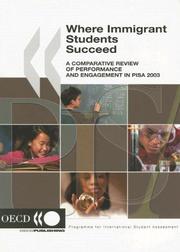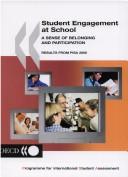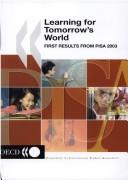| Listing 1 - 10 of 10 |
Sort by
|
Book
ISBN: 9282668347 Year: 1993 Publisher: Luxembourg EUR-OP
Abstract | Keywords | Export | Availability | Bookmark
 Loading...
Loading...Choose an application
- Reference Manager
- EndNote
- RefWorks (Direct export to RefWorks)
School management --- Europe --- Grade repetition --- Redoublement de classes --- Historische en vergelijkende pedagogiek. --- Onderwijs 37 --- EG / Europese Unie 339.543EC/EU
Book
ISBN: 9789044134490 9044134493 Year: 2016 Publisher: Antwerpen : Garant Uitgevers,
Abstract | Keywords | Export | Availability | Bookmark
 Loading...
Loading...Choose an application
- Reference Manager
- EndNote
- RefWorks (Direct export to RefWorks)
Dit boek biedt sociologische beschouwingen over het onderwijs. Een dertigtal gerenommeerde onderwijswetenschappers presenteert een breed scala aan inzichten en maakt duidelijk dat een sociologische kijk op onderwijs een vruchtbare en onmisbare aanvulling vormt op allerlei andere perspectieven.Daarmee is het boek een aanrader voor iedereen die betrokken is bij onderwijs, van de student die wat verder gevorderd is , tot onderwijsprofessionals die zich willen verdiepen in de maatschappelijke betekenis van hun werk. Ook wie beroepshalve bezig is met de inrichting van onderwijs (directeur, bestuurder, beleidsbeïnvloeder, ambtenaar, politicus) doet er goed aan dit boek te lezen. De inzichten blijken opvallend goed bruikbaar in de analyse van de complexiteit waar het moderne onderwijsstelsel zich voor gesteld ziet. Zowel de situatie in Nederland als in Vlaanderen wordt daarbij in beeld gebracht.
onderwijssociologie --- Sociology of education --- Netherlands --- Flanders --- #SBIB:316.334.1O110 --- 371 --- Onderwijssociologie: handboeken, introducties: algemeen --- Onderwijs 37 --- sociologisch onderzoek 303.1 --- Educational sociology --- Onderwijssociologie --- 450.42 --- onderwijssociologie, democratisering van het onderwijs
Book
ISBN: 9789264056053 926405605X 9264068783 9789264068780 Year: 2009 Publisher: Paris : OCDE, Teaching and Learning International Survey,
Abstract | Keywords | Export | Availability | Bookmark
 Loading...
Loading...Choose an application
- Reference Manager
- EndNote
- RefWorks (Direct export to RefWorks)
This publication is the first report from the International Teaching and Learning Survey (TALIS). It provides quantitative, policy-relevant information on the teaching and learning environment in schools in 23 countries and has a focus on lower secondary education. School effectiveness research consistently shows that the quality of the learning environment is the most important policy-malleable factor for positive student learning and student outcomes. In recognition of this, TALIS explores key policies and practices that shape the learning environment. The important role that school leadership can play in creating effective schools is well documented. TALIS illustrates the roles and functions that school leaders adopt within schools – often facing quite different circumstances - and examines how these roles support teachers in their work. Retaining and developing effective teachers is a priority in all school systems and TALIS examines how teachers‟ work is recognised, appraised and rewarded and how well the professional development needs of teachers are being addressed. Perhaps the most innovative aspect of TALIS is the insights it provides on the teaching beliefs that teachers bring to the classroom and the pedagogical practices that they adopt. TALIS cannot measure which practices or beliefs are most effective but it does show how these associate with some of the conditions that are pre-requisites for effective schooling.
Education --- Teaching --- Enseignement --- Statistics --- Methodology --- Statistiques --- Méthodologie --- Project method in teaching. --- Onderwijs 37 --- Onderwijspersoneel 371.12 --- Leermethoden 371.3 --- Méthodologie --- Methodology. --- Elementary school teachers --- Teachers --- Educational surveys --- Educational evaluation --- Statistics. --- Teaching and Learning International Survey
Book
ISBN: 908964105X 9786612068010 1282068016 904850872X 9789048508723 9789089641052 Year: 2009 Publisher: Amsterdam : Amsterdam University Press,
Abstract | Keywords | Export | Availability | Bookmark
 Loading...
Loading...Choose an application
- Reference Manager
- EndNote
- RefWorks (Direct export to RefWorks)
Volgens dit 83ste rapport van de WRR moeten scholen aan dreigende schooluitvallers niet alleen onderwijs geven, maar ook alle sociaal-emotionele zorg en steun die nodig is om een plaats in de samenleving te veroveren. Scholen moeten aan dreigende schooluitvallers niet alleen onderwijs geven, maar ook alle sociaal-emotionele zorg en steun die nodig is om een plaats in de samenleving te veroveren. Alleen op scholen met een dergelijke brede taakopvatting bestaat een reële kans om te voorkomen dat de meest kwetsbare jongeren volledig buiten de maatschappij komen te staan. De regering moet scholen
Dropouts -- Netherlands -- Prevention. --- School management and organization -- Netherlands. --- Schools --Netherlands. --- Students -- Academic workload -- Netherlands. --- Dropouts --- Education and state --- Students --- Burn out (Psychology) --- Psychology --- Burnout (Psychology) --- Pupils --- School life --- Student life and customs --- Drop-outs --- Early school leavers --- School dropouts --- Education --- Job satisfaction --- Job stress --- Motivation (Psychology) --- Stress (Psychology) --- Persons --- Youth --- Onderwijs 37 --- Jeugdproblematiek 301.185.3-053.7 --- 371.78 --- 371.78 Geestelijke gezondheidszorg in het onderwijs --- Geestelijke gezondheidszorg in het onderwijs --- popular science --- wetenschap algemeen

ISBN: 9264023607 9789264023604 9786611746872 1281746878 9264023615 9789264023611 Year: 2006 Publisher: Paris : Organisation for Economic Co-operation and Development,
Abstract | Keywords | Export | Availability | Bookmark
 Loading...
Loading...Choose an application
- Reference Manager
- EndNote
- RefWorks (Direct export to RefWorks)
Drawing on data from the OECD’s Programme for International Students Assessment (PISA), this report examines the performance of students with immigrant backgrounds and compares it to that of their native counterparts. As well as providing information on countries’ approaches to the integration of immigrants, it looks at other factors that could influence immigrant students’ performance – such as their attitudes to school, their motivation and learning strategies as well as their social background and the language spoken at home – giving valuable implications for educational policy.
Didactic evaluation --- slaagkansen --- prestaties --- allochtone jongeren --- evaluatie (onderwijs) --- onderwijsonderzoek --- Immigrants --- Children of immigrants --- Educational attainment --- Education --- Students, Foreign. --- Etudiants étrangers --- Education. --- etnisch-culturele minderheden --- Onderwijs, bestuur --- Statistiek --- #SBIB:316.334.1O140 --- #SBIB:316.334.1O212 --- #SBIB:316.334.1O410 --- Bevolking 312 --- Migranten 325.11 --- OESO / OCDE / OECD 339.92OECD --- Onderwijs 37 --- 668.4 Migrantenjongeren --- 742 Scholieren en studenten --- Emigrants --- Foreign-born population --- Foreign population --- Foreigners --- Migrants --- Persons --- Aliens --- Attainment, Educational --- Education level completed --- Level of education completed --- School years completed --- Years of school completed --- Academic achievement --- First generation children --- Immigrants' children --- Second generation children --- Onderwijsstatistieken: algemeen --- Onderwijsbeleid: nationaal --- Leergedrag: cognitief gedrag, studieresultaten: algemeen

ISBN: 9264018921 9789264192829 9789264186750 926401893X 9786610030927 9264192824 Year: 2003 Publisher: Paris : OECD Publishing,
Abstract | Keywords | Export | Availability | Bookmark
 Loading...
Loading...Choose an application
- Reference Manager
- EndNote
- RefWorks (Direct export to RefWorks)
How widespread is student disaffection with school in different education systems? What policies and practices are most effective in fostering students’ sense of belonging and participation in school? These questions are of great concern to educators in many countries, not only because of the interrelationship between student engagement at school and learning outcomes, but also because student engagement represents a valued outcome in itself. The OECD PISA provides not only information on students’ literacy skills, but also on their attitudes and values, their social backgrounds, and on important features of the schools they attend.
Didactic evaluation --- High school dropouts. --- Motivation in education. --- School attendance. --- Students --- Attitudes. --- Education, Preschool --- Government policy --- Government policy. --- Children --- Infant education --- Prekindergarten --- Preschool education --- Early childhood education --- Nursery schools --- Education (Preschool) --- High school dropouts --- Motivation in education --- School attendance --- OESO / OCDE / OECD 339.92OECD --- Onderwijs 37 --- Onderwijsbeleid 37.014 --- Absence from school --- Attendance, School --- Student attendance --- Truancy (Schools) --- School management and organization --- Academic motivation --- Academic achievement --- Learning, Psychology of --- Motivation (Psychology) --- Secondary school dropouts --- Dropouts --- High school students --- Attitudes --- Elèves --- Motivation en éducation --- Psychology --- Psychologie --- Programme for International Student Assessment --- Students.

ISBN: 9264007245 9789264006416 9789264007246 9264006419 Year: 2004 Publisher: Paris : OCDE (Organisation de coopération et de développement économiques) = OECD (Organisation for Economic Co-operation and Development),
Abstract | Keywords | Export | Availability | Bookmark
 Loading...
Loading...Choose an application
- Reference Manager
- EndNote
- RefWorks (Direct export to RefWorks)
This report presents the first internationally comparable results to OECD's 2003 Programme for International Student Assessment (PISA) Survey of the educational performance of 15-year-olds in reading, mathematics, and science in 25 OECD countries. This year, the concentration was on mathematics. Beyond the examination of the relative standing of countries in mathematics, science and reading, the report also looks at a wider range of educational outcomes that include students’ motivation to learn, their beliefs about themselves, and their learning strategies. Furthermore, it examines how performance varies between the genders and between socio-economic groups; and it provides insights into some of the factors that influence the development of knowledge and skills at home and at school, how these factors interact and what the implications are for policy development. Most importantly, the report sheds light on countries that succeed in achieving high performance standards while, at the same time, providing an equitable distribution of learning opportunities. The report presents a wealth of indicators showing how countries compare in various measures of educational performance and factors that affect that performance.
Didactic evaluation --- Academic achievement --- Education and state --- Mathematical ability --- Problem solving --- Reading --- Science --- OESO / OCDE / OECD 339.92OECD --- Onderwijs 37 --- 51 --- Literacy testing --- Mathematics --- Education --- Education policy --- Educational policy --- State and education --- Social policy --- Endowment of research --- Academic underachievement --- Achievement, Academic --- Educational achievement --- Scholastic achievement --- Scholastic success --- School achievement --- Student achievement --- Underachievement, Academic --- Performance --- Success --- 51 Mathematics --- Testing --- Ability testing --- Government policy --- Material de apoyo Educación contínua. --- Educación contínua --- Materiales de apoyo Educación contínua --- Academic achievement. --- Education and state. --- Estratégias de aprendizaje. --- Testing. --- Ability testing. --- Academic performance --- Academic progress --- Academic success --- Achievement, Scholastic --- Achievement, Student --- Performance, Academic --- Progress, Academic --- School success (Academic achievement) --- Success, Academic --- Success, School (Academic achievement) --- Success, Scholastic --- 51 Wiskunde. Mathematiek --- Wiskunde. Mathematiek --- Lecture --- Mathématiques --- Eleve -- comportement --- Eleve -- participation --- Enseignement des sciences --- Evaluation scolaire --- Facteur socio-culturel --- Statut socio-economique
Book
ISBN: 9289486317 Year: 2006 Publisher: Luxembourg Bureau voor Officiële Publicaties der Europese Gemeenschappen
Abstract | Keywords | Export | Availability | Bookmark
 Loading...
Loading...Choose an application
- Reference Manager
- EndNote
- RefWorks (Direct export to RefWorks)
Social policy --- tewerkstelling --- sociaal beleid --- sociale integratie --- European Union --- Social integration --- Intégration sociale --- #SBIB:327.7H231 --- #SBIB:316.8H00 --- Sociaal beleid 304:32 --- Armoede 330.521 --- Arbeidsmarkt 331.52 --- Sociale zekerheid 368.4 --- Huisvesting 728.1:338.23 --- Gezondheidszorg 61 --- Onderwijs 37 --- Vervoer 656 --- Cultuur 008 --- EG / Europese Unie 339.543EC/EU --- 337.9 UE --- 304.1 --- 339.12 --- 331.6 --- 368.4 --- 37 --- 656 --- EEC / European Union - EU -Europese Unie - Union Européenne - UE --- 313 --- 334.151.50 --- 202 --- Europese Unie: sociaal-economisch beleid, landbouw-, milieu-, cultuur- en communicatiebeleid --- Sociaal beleid: algemeen --- Union Européenne - UE --- sociale politiek --- armoede --- arbeidsmarkt - arbeidsmarktvraagstukken - arbeidsmarktstudie - arbeidsmarkt, analyse van de - arbeidsplaatsen --- sociale zekerheid - sociale verzekering --- onderwijs en opvoeding --- vervoer - transport --- Levenswijze en levensstandaard. Levensminimum. sociale indicatoren (Studiën). --- Sociaal beleid : algemeenheden. --- Sociale organisatie. --- Intégration sociale --- Sociale organisatie --- Levenswijze en levensstandaard. Levensminimum. sociale indicatoren (Studiën) --- Sociaal beleid : algemeenheden
Book
ISBN: 9054870265 9789054870265 Year: 1993 Publisher: Brussel : VUB press,
Abstract | Keywords | Export | Availability | Bookmark
 Loading...
Loading...Choose an application
- Reference Manager
- EndNote
- RefWorks (Direct export to RefWorks)
History of education and educational sciences --- leerlingenbegeleiding --- PMS-centra --- Pupil counseling. Pupil guidance --- historische pedagogiek --- Belgium --- Assistance sociale --- Enseignement --- Geschiedenis --- Histoire --- Maatschappelijk werk --- Onderwijs --- Psychologie --- Sociologie --- Belgique ; histoire --- België ; geschiedenis --- Vocational guidance --- Educational counseling --- Orientation professionnelle --- Orientation scolaire --- Histoire de l'enseignement --- --Belgique --- --PMS --- --Histoire --- --onderwijspolitiek --- PMS --- #PEDA *1.048 <493> --- #PEDA *1 <091> --- #SBIB:HIVA --- #SBIB:316.334.1O120 --- #GBIB:CBMER --- #A9404A --- #KVHB:Onderwijsbegeleiding --- #KVHB:PMS. Zie: Studie- en beroepsorientering --- #KVHB:Studie- en beroepsorientering --- Onderwijs 37 --- Gezondheidszorg 61 --- 431.2 --- 371.1 --- 371.21 --- Onderwijssociologie: geschiedenis van de opvoeding en onderricht --- Geschiedenis van opvoeding en onderwijs --- Historische en vergelijkende pedagogiek --- Pedagogiek en onderwijskunde --- handboeken en inleidingen --- psychologische pedagogiek --- Historische en vergelijkende pedagogiek. --- PMS-centra. --- handboeken en inleidingen. --- psychologische pedagogiek. --- onderwijspolitiek --- Handboeken en inleidingen. --- Psychologische pedagogiek. --- --Geschiedenis van opvoeding en onderwijs --- History --- --Vocational guidance --- Belgique --- BELGIQUE --- CONDITIONS SOCIALES --- 20E SIECLE --- ETUDE ET ENSEIGNEMENT --- HISTOIRE SOCIALE --- CENTRES PSYCHO-MEDICO-SOCIAUX
Book
ISBN: 9782874631221 2874631221 Year: 2008 Volume: 7 Publisher: Louvain-la-Neuve: Presses universitaires de Louvain,
Abstract | Keywords | Export | Availability | Bookmark
 Loading...
Loading...Choose an application
- Reference Manager
- EndNote
- RefWorks (Direct export to RefWorks)
Vocational qualifications --- Adult education --- Qualifications professionnelles --- Education des adultes --- Certification --- Attestation --- Beroepskwalificaties 331.543 --- Onderwijs 37 --- Enseignement --- Formation professionnelle continue --- BPB0902 --- Onderwijs --- Voortdurende bijscholing --- jatkuva ammatillinen koulutus --- voortdurende bijscholing --- stalno poklicno usposabljanje --- formim profesional i vazhdueshëm --- formação profissional contínua --- continuing vocational training --- συνεχής επαγγελματική κατάρτιση --- taħriġ vokazzjonali kontinwu --- folyamatos szakmai továbbképzés --- priebežná odborná príprava --- ständige berufliche Weiterbildung --- formación profesional continua --- yrkesinriktad fortbildning --- ustawiczne szkolenie zawodowe --- formazione professionale continua --- постојана професионална обука --- průběžná profesní příprava --- trajna strukovna izobrazba --- formare profesională continuă --- продължаване на професионалната подготовка --- täiendkutseõpe --- faglig efter- og videreuddannelse --- tālākā profesionālā izglītība --- tęstinis profesinis mokymas --- стална професионална обука --- постојано стручно усовршување --- yrkesfortbildning --- celoživotní odborná příprava --- доживотно професионално усовршување --- průběžné odborné vzdělávání --- lifelong vocational training --- celoživotní profesní příprava --- celoživotná odborná príprava --- täiskasvanute tööalane koolitus --- постојана стручна обука --- cjeloživotna strukovna izobrazba --- континуирано професионално усовршување --- profesionālā mūžizglītība --- συνεχιζόμενη επαγγελματική κατάρτιση --- trajno usavršavanje --- profesinis mokymas visą gyvenimą --- průběžná odborná příprava --- élethosszig tartó szakképzés --- trajnim profesional gjatë gjithë jetës --- εκπαίδευση --- Unterrichtswesen --- teaching --- mokymas --- poučevanje --- pedagogie --- vyučovanie --- undervisning --- mācīšana --- ensino --- utbildningsväsen --- enseñanza --- tanítás --- настава --- onderwijs --- õpetamine --- opetus --- преподаване --- tagħlim --- insegnamento --- mësimdhënie --- školství --- nastava --- szkolnictwo --- предавање --- обучување --- výučba --- výuka --- obuka --- predare --- skoleuddannelse --- pagesë shkollimi --- поучување --- часови --- vyučování --- schoolopleiding --- podučavanje --- подучување --- skolväsen --- διδασκαλία --- poučavanje --- tuition --- Schulwesen --- gairmoiliúint leanúnach --- teagasc
| Listing 1 - 10 of 10 |
Sort by
|

 Search
Search Feedback
Feedback About UniCat
About UniCat  Help
Help News
News